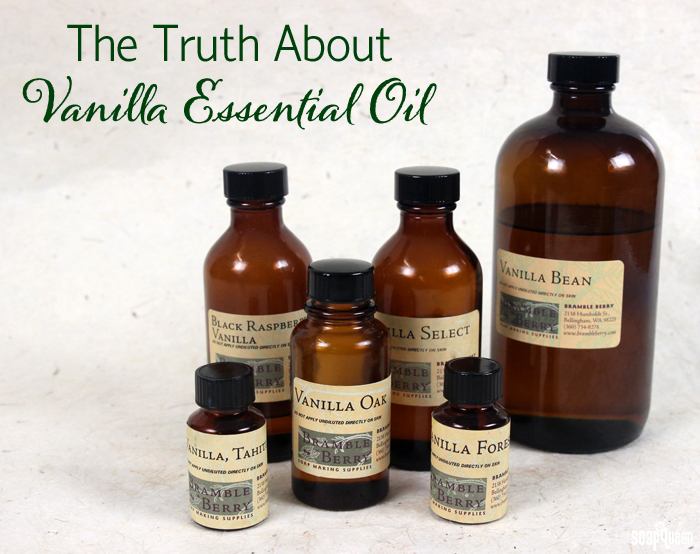
Vanilla may be one of the most popular scents ever. It’s sweet, warm, complex and comforting. It’s versatile and blends well with a variety of other fragrance notes including sweet, spicy, floral and clean. Bramble Berry has more than 10 different vanilla-centric fragrance oils, including Vanilla Bean Fragrance Oil, Vanilla Vanilla Cybilla Fragrance Oil, Sandalwood Vanilla Fragrance Oil and Black Raspberry Vanilla Fragrance Oil.
With so many different fragrance oils featuring vanilla, you’re sure to find just the right blend for your project. But, you may be asking yourself, what about a vanilla essential oil? Can vanilla ever be natural?Good question! The short and rather unfortunate answer is 100% pure vanilla essential oils do not exist. Vanilla fragrance is easy to create synthetically in a lab, but the nature of the vanilla bean does not allow for the distillation process which produces essential oils. Before you say, “Bu, bu, bu, I’ve seen it in the stores,” there is a way to extract scent from the vanilla bean, but it’s not considered an essential oil. Read on to find out the hows and the whys of vanilla absolute and extracts.
Based on the definition from the International Organization for Standardization, essential oils are defined as “a product obtained from a natural raw material of plant origin, by steam distillation, by mechanical processes from the epicarp of citrus fruits, or by dry distillation, after separation of the aqueous phase — if any — by physical processes.” Click here to read this statement, which is included in their vocabulary of aromatic natural raw materials (ISO/D1S9235.2).
 Essential oils such as Orange Valencia, Hungarian Lavender and Roman Chamomile are distilled from natural plants.
Essential oils such as Orange Valencia, Hungarian Lavender and Roman Chamomile are distilled from natural plants.
There are several different kinds of essential oil distillation methods including (but not limited to) steam distillation, cold pressing and expeller pressing. The distillation method used depends on the type of plant material. For example, cold pressed distillation is commonly used for peels and rinds to produce Grapefruit Essential Oil and Lemon Essential Oil. Steam distillation is perhaps the most common form of extracting and creating essential oils. This is because steam distillation generally yields the largest amount of oil for most plants and maintains the integrity of the desired compounds.
The aromatic compounds of the vanilla bean cannot be attained by distillation. The only way to release the aromatic compounds of the vanilla bean and other delicate plants is to introduce a solvent. Aromatic, concentrated oils from plants derived by introduction of a solvent are referred to as an “absolute.” Common absolutes made from delicate plant matter include jasmine and rose absolute.
Absolutes are similar to essential oils. Both essential oils and absolutes are oils produced by plant matter. To produce an absolute, the plant material is placed into a drum and introduced to a solvent along with gentle heat. The solvent is then removed, which leaves behind a resin known as a concrète or resinoid. This resin is then treated with alcohol to separate the aromatic compounds. An absolute is the most concentrated form of plant material, and may be thicker in consistency than an essential oil produced by distillation. Typically, absolutes are extremely pricey and often don’t make economical sense for soap products.
If you search for “Vanilla Essential Oil,” you will indeed find products labeled as such. Most commonly, this product is simply vanilla extract that has been diluted with a carrier oil, such as jojoba oil. These products may also be synthetic fragrance oils or an oil infusion. Vanilla extract found in the grocery store is very different than a vanilla essential oil or absolute. What makes them different is how they are produced.
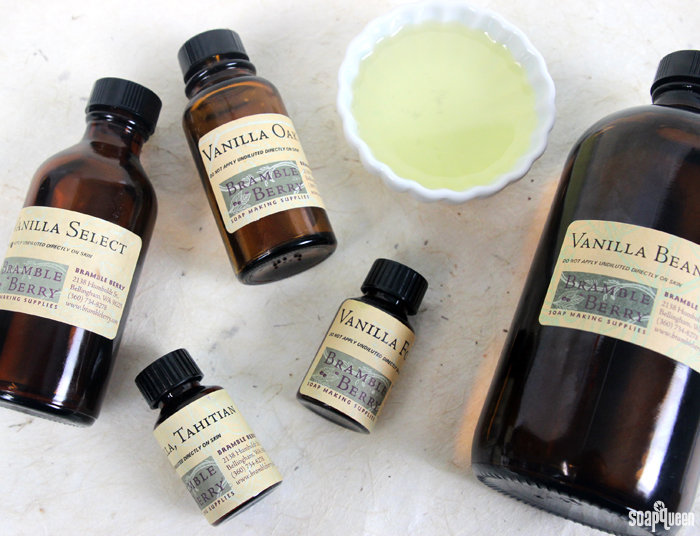 Bramble Berry carries a wide selection of vanilla scents, including Vanilla Select, Vanilla Oak and Vanilla Bean Fragrance Oil.
Bramble Berry carries a wide selection of vanilla scents, including Vanilla Select, Vanilla Oak and Vanilla Bean Fragrance Oil.
Vanilla extract found in the grocery store is usually either synthetically produced with vanillin or is produced from vanilla beans extracted in alcohol. When shopping for vanilla extract, the price is usually the easiest way to differentiate between the two – imitation vanilla extract is cheap, while “real” vanilla extract can be quite expensive. Because vanilla extract is made by extracting the vanilla flavor with alcohol, it is very different from an essential oil and should not be used in the same way. Vanilla extract should not be used in soap, as adding alcohol to soap can cause unpredictable and negative results. Plus, vanilla extract won’t leave any scent in your soap, making it a waste.
Like vanilla, there are many plants that do not allow for the distillation process. Consider a strawberry; while it is a plant, it will not produce an oil when distilled. Products claiming to be a “strawberry essential oil” may contain some strawberry material, but not 100% pure oil. When purchasing essential oils, make sure they come from a reputable source. When shopping for essential oils, look for the distillation method, the country of origin and the botanical name. This information is crucial in determining if the product is in fact an essential oil. Contact the manufacturer of the oil if you have any doubts regarding its purity.
If you’re looking for more information on vanilla fragrance oils, including vanilla discoloration and vanilla-centric tutorials, check out the posts below!
“Why Did My Soap Turn Brown?”
Best Selling Bramble Berry Fragrance Oils + Discoloration
Fragrance Oil Blending Tips
Vertical Sandalwood Vanilla Soap, With a Twist!
Neapolitan CP for Valentine’s Day
Chocolate Mint Melt and Pour Squares
Holiday Cookie Bar Cold Process Tutorial
Strawberry Vanilla Doughnut Melt and Pour
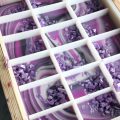
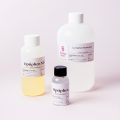

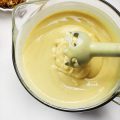
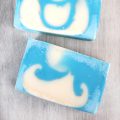
I found a DIY liquid laundry detergent that works REALLY well, but has no smell (by choice, because I only like/tolerate the vanilla scent. Would the Vanilla Non-Discoloring Fragrance Oil work in a diy laundry detergent made of:
1 cup grated bar of Kirk’s Fragrance Free Soap
½ cup Arm & Hammer Super Washing Soda
1 cup OxiClean (Baby or Free)
3 gallons tap water
I would LOVE my laundry having a mild vanilla smell!
Thank you so much!
Absolutely, that would give you a nice vanilla scent! I would recommend weighing your recipe once it’s all made. Once you have the total weight, our Fragrance Calculator will tell you how much scent to add: https://www.brambleberry.com/Pages/Fragrance-Calculator.aspx
-Kelsey with Bramble Berry
Non-Discoloring Vanilla Fragrance Oil: https://www.brambleberry.com/Vanilla-Non-discoloring-Fragrance-Oil-P3908.aspx
Hi, I bought some vanilla essential oil from Voyageur in B.C. Are you saying that I can’t use this oil in cold process soap?
If that scent is skin safe and approved for use in soap, you can definitely add it! You may want to check with the manufacturer to find out how much to use in your batch. 🙂
-Kelsey with Bramble Berry
Thanks for your reply! I did use it and the soap turned out great!
Have you ever come across this product?
It’s a CO2 extraction, solvent-free
http://www.livinglibations.com/default/vanilla-essential-oil
We’re not familiar with that one! It looks like it’s used for cooking. Because it’s an extract, it may not work too well in cold process soap. You may want to make a small test batch with it to see if it works in your recipe. 🙂
-Kelsey with Bramble Berry
Hi! I was wondering about using vanilla or almond extract in lotion. I found another recipe online using extract and I made a small batch and it seems to work fine. I just worry about it being safe on the skin (especially if I sell it) and how long the scent will last. Do you have any insight? Thanks!
Hi Jessica!
Because they’re not made for cosmetics the scent may fade or they may do other weird things in lotion. Some also contain alcohol, which can be drying or irritating on the skin. Instead, we recommend fragrance or essential oils for your batch. They’re skin safe and scent the lotion well. 🙂
Fragrance oils: https://www.brambleberry.com/Fragrance-Oils-C161.aspx
Essential oils: https://www.brambleberry.com/Essential-Oils-C157.aspx
Find out how much to add with our Fragrance Calculator: https://www.brambleberry.com/Pages/Fragrance-Calculator.aspx
-Kelsey with Bramble Berry
Is there any way to get my shea butter to smell like Vanilla? I use to sell butters using Vanilla Select [a tsp per 4 ounces of shea] but a few clients stated that it still smelled like shea butter, or playdoh! How much should I use so it doesn’t irritate the skin?
Shea butter does have a natural smell that can mix with the vanilla fragrance. You can add up to .24 ounces of Vanilla Select per pound of shea butter. That may help a bit more vanilla come through. It can also help to use refined shea butter if you’re not already. It has a milder smell than the unrefined version. 🙂
I found that amount using the “Lotion” option on the Fragrance Calculator: https://www.brambleberry.com/Pages/Fragrance-Calculator.aspx
-Kelsey with Bramble Berry
Vanilla Select Fragrance Oil: https://www.brambleberry.com/Vanilla-Select-Fragrance-Oil-P3888.aspx
Shea butter: https://www.brambleberry.com/Shea-Butter-P3220.aspx
Can sandalwood absolute be used in cold processed soap? If so, how much per pound of oil?
It can! You can use our Fragrance Calculator to find out how much to use in your recipe: https://www.brambleberry.com/Pages/Fragrance-Calculator.aspx
-Kelsey with Bramble Berry
Sandalwood essential oil: https://www.brambleberry.com/sandalwood-essential-oil-p5355.aspx
With the vanilla discoloration/scents…I used Cinnamon Stick in a bubble bar, white and red striped. After drying for a week, it turned completely brown and turned the water brown as well (not a pretty picture). If I use that same scent or any other vanilla in bath bombs, will I have the same outcome??
Hi Jennifer!
Scents that contain vanilla can discolor bath bombs, lotion, etc. They will always discolor soap but the results in bath bombs can be more inconsistent. They may never discolor, or may get discolored spots. To be extra careful and prevent any discoloration, it’s best to use vanilla-free fragrances. 🙂
Clear and vanilla free fragrances: https://www.brambleberry.com/Clear-Vanilla-Free-C491.aspx
-Kelsey with Bramble Berry
Has anyone tried adding scraped vanilla bean innards to their soaps?
We haven’t done any testing with vanilla bean! I don’t think you would get a lot of scent from the insides. It may add a cute speckled look though. I would recommend making a small test batch to see if the vanilla has any odd reactions with the lye. That way you know before you make a larger batch. 🙂
Someone on teachsoap.com/forum may know more about using vanilla bean in soap as well!
-Kelsey with Bramble Berry
I would like to make vanilla candles but not with synthetic products. I cannot find any information anywhere about this. Any idea on how to do this it has to be possible. It’s actually for wax melts not candles.
Hi Melissa!
Just to clarify, are you wanting to use essential oils to scent your candles? If so, you can do that! We just recommend testing the essential oils in candles before making a larger batch. Some of the essential oils can smell a bit odd when they’re burned. Read more about using essential oils in candles here: https://www.soapqueen.com/bath-and-body-tutorials/tips-and-tricks/can-add-fragrance-oils-candles/
Because there isn’t a true vanilla essential oil, you would need to use fragrance oils, which are synthetic. You may also try balsam Peru essential oil! It has a smoky scent reminiscent of vanilla. 🙂
Balsam Peru Essential Oil: https://www.brambleberry.com/Balsam-Peru-Essential-Oil-P4443.aspx
-Kelsey with Bramble Berry
Take a look into vanilla co2 method, it is not an absolute or a synthetic. But it will cost a very pretty penny.
Hi there!
You’re right, vanilla CO2 is close to distilled essential oils, but is still not quite the same. Essential oils are extracted using carbon dioxide and high heat. While it is closer in makeup to essential oils, and doesn’t use a solvent like absolutes, it still isn’t quite the same as distilled essential oils. But, it is a good option for some applications!
-Amanda with Bramble Berry
Hi Kelsey,
I have been making my own insect repellent with essential oils which is fine. I read research somewhere that when Vanillin extract was added, because it has a larger molecule it “held” the essential oil or decreased the essential oil volatility. This caused the effectiveness of the essential oil to last for many more hours – like from 2 to 6 hours(I can’t remember which EO in particular but it seemed to me to be a general thing).
I have found vanilla 10 fold oil for sale. Do you think this is might be what they are talking about and if it is, I have read that it is immiscible in oil and water. Would this mix into a cream base with EO’s?
Another thing, I was wondering about the viscosity of EO’s. Does viscosity have a relationship to the molecular size and volatility? I am wondering if that would make Neem Oil less volatile and longer lasting (thicker than say Lemon Grass) and do you think blending these would slow down the loss of say Lemon Grass.
I can run some back yard tests but if someone knows the answers why reinvent the wheel:)
Thanks for your time.
Hi Deborah!
Because I haven’t worked with the vanilla 10 fold, I’m not entirely sure if that would help the scent stick. I’m sorry about that Deborah! I would recommend contacting the manufacturer to learn more about the vanilla 10 fold. They may be able to give you more information. 🙂
I am also not familiar with the viscosity of the essential oils and whether that relates to the molecular size and volatility. Someone who may know is Susan with Swifty Craft Monkey! Her blog deals with the science behind soap and cosmetics. You can contact her here: https://www.blogger.com/profile/08929716042707110612
And find her blog here: http://swiftcraftymonkey.blogspot.com/
-Kelsey with Bramble Berry
I recently used a vanilla absolute oil on my skin and broke out in a bad allergic rash! I’m sure some of the soaps and concoctions you all are making will be a little less strong than what I used, but still be careful. Supposedly real essential oils don’t trigger allergic reactions.
I’m sorry about that Amber! We don’t recommend applying essential oils or absolutes directly on the skin. Undiluted, they can be irritating on the skin. We recommend to mix them in a recipe, like soap or lotion.
Even diluted, some essential oils can be irritating on the skin. For instance, cinnamon leaf essential oil at a higher usage rate can be irritating. Before using any of our essential oils, we recommend checking out the descriptions to see how they work on the skin. 🙂
Essential oils: https://www.brambleberry.com/Essential-Oils-C157.aspx
-Kelsey with Bramble Berry
I came across your site after buying a product claiming to be a Vanilla absolute essential oil. It is very liquid and smells strong and nothing like baking Vanilla Extract. It was kind of expensive so I’m very dissapointed. I used to have another one claiming to be a Vanilla essential oil and that one used to resemble the common Vanilla smell a little more. I was wondering if you could help me out, how can you describe the smell of the real deal? I have no experience. Thanks in advance!
Hi Daniel!
Absolutely! Compared to a fragrance oil, a vanilla absolute smells a lot less sweet. It also has a sharper, slightly earthy quality, depending on the batch of oil.
Because there is no true essential oil, I’m wondering if you got a synthetic vanilla fragrance oil or vanilla extract mixed with a carrier oil. Typically, vanilla fragrance oil smells sweeter – more like the vanilla scent you find in candles and bath and body products.
Synthetic vanilla fragrance oils are your best bet for soap and other handmade products. They scent it nice and strongly, and are a more economical option than absolutes. You can find all our vanilla fragrance oils here: https://www.brambleberry.com/Search.aspx?k=vanilla
Find out how much oil to add to your batch with our Fragrance Calculator: https://www.brambleberry.com/Pages/Fragrance-Calculator.aspx
-Kelsey with Bramble Berry
This question is not about soap, but still very relevant.
What would happen if pure vanilla extract (the good stuff in alcohol) were added to the water phase during lotion making?
I’ve tried this in the past & found that my lotion was separating after sitting a few days. I’m a beginner when it comes to lotion making so I wasn’t sure if the issue of separation was due to the high alcohol volume in the extract Or die to my lack of skill.
Any insight would be greatly appreciated!
Hi Walker!
Adding alcohol to the water phase of your lotion is likely to break down the emulsification. Most likely, this is what happened to your lotion in the past. You may be able to add small amounts without it separating, but the more you add, the more likely separation will occur. You may be able to blend your lotion with a stick blender or several minutes to blend the mixture back together, but to be safe, I wouldn’t recommend using it to be on the safe side 🙂
-Amanda with Bramble Berry
Is vanilla extract (with alcohol) more pungent than vanilla infusion (with oil)? If I used the same number of vanilla beans with the same volume of either alcohol or oil, which one comes out more fragrant?
Hi Victoria!
I would imagine infusing the vanilla beans in alcohol would give you a bit stronger scent! Vanilla extract does smell rather pungent. However, we don’t recommend using vanilla extract in soap. It accelerates heavily, and the smell won’t be very noticeable in the final bars.
Infusing vanilla in oil will give you a more subtle scent, and can be used in cold process soap. However, the smell won’t be very strong at all in the final bars either. Read more about infusing oils here: http://www.soapqueen.com/bath-and-body-tutorials/tips-and-tricks/how-to-infuse-oils-with-a-crock-pot/
For the strongest scent, I would recommend vanilla fragrance oil. They are specifically formulated to scent soap and other products, like lotion. You may like Vanilla Bean Fragrance Oil. The scent reminds me of vanilla extract a little bit. 🙂
Vanilla Bean Fragrance Oil: https://www.brambleberry.com/Vanilla-Bean-Fragrance-Oil-P3922.aspx
Find out how much to add to your recipe with our Fragrance Calculator: https://www.brambleberry.com/Pages/Fragrance-Calculator.aspx
-Kelsey with Bramble Berry
okay yet another question: what if I just added vanilla extract from my kitchen with the soap melt and pour base? or add vanilla extract from my kitchen to my skin cream?
I’ve seen it offered to add to oatmeal skin sugar scrub.
We don’t recommend adding vanilla extract to soap or skin cream. It is intended for use in food, so it can do weird things in your bath products. On top of that, the smell won’t be very strong at all – you may not even be able to smell it.
We recommend using skin-safe fragrance or essential oils in your bath and beauty products!
Fragrance oils: https://www.brambleberry.com/Fragrance-Oils-C161.aspx
Essential oils: https://www.brambleberry.com/All-Oils-C23.aspx
Find out how much to add with our Fragrance Calculator: https://www.brambleberry.com/Pages/Fragrance-Calculator.aspx
-Kelsey with Bramble Berry
I have a question…I just used vanilla fragrance oil in a skin cream and it did NOT turn brown. I haven’t tried it yet in my homemade soap. Question Is it only Vanilla essential oil that turns soap brown, and not vanilla fragrance oil? if so is it because of how the vanilla essential was made? I have also heard that there is an ingredient that you have to add to your soap to stop the vanilla essential oil from turning it brown. would that ingredient be safe? I try to use essential, oils as much as possible but if I have to stop using vanilla I will if it means that I have to use a chemical additive to stop stuff from turning brown by using vanilla essential oil. many thanks for the answers forthcoming.
Hi Jean!
If the fragrance or essential oil has vanillin in it, it will discolor melt and pour and cold process soap. Vanillin is the organic compound that gives vanilla its flavor. Vanillin can also cause discoloration in lotion, but it is a bit more inconsistent! The discoloration may never happen, or can form over time. It’s hard to say 100% with other bath products like lotion and bath bombs.
In melt and pour soap, you can use Vanilla Color Stabilizer at a 1:1 ratio with the fragrance oil to prevent discoloration. Vanilla Color Stabilizer is a synthetic product. Also, it doesn’t work too well in cold process soap.
Read more about discoloration here: http://www.soapqueen.com/bath-and-body-tutorials/tips-and-tricks/why-did-my-soap-turn-brown/
If you prefer to avoid Vanilla Color Stabilizer, you can work with the discoloration! We have several tutorials that use discoloration as part of the design, like this Vertical Sandalwood Vanilla Soap: http://www.soapqueen.com/bath-and-body-tutorials/cold-process-soap/vertical-sandalwood-vanilla-soap-with-a-twist/
And this Honey Beeswax Cold Process Soap: http://www.soapqueen.com/bath-and-body-tutorials/cold-process-soap/honey-beeswax-cold-process-tutorial/
Hope that helps! 🙂
-Kelsey with Bramble Berry
Vanilla Color Stabilizer: https://www.brambleberry.com/Vanilla-Color-Stabilizer-P4156.aspx
I brought some lovely soap from AKOMA and have been trying to work out how this company only uses Vanilla palnifolia fruit (natural vanilla extract) listed in the ingredients to scent their vanilla soap as it does smell the soap (not to a powerful scent like a fragrance oil but a mild scent).
Hi Helen!
I’m not entirely sure! You may want to contact the manufacturer to find out more. They may have more information. 🙂
-Kelsey with Bramble Berry
My aunt used to make soap 10-15 years ago. I have now taken over her hobby and she gave me all of her essential oils she used and one oil was White Vanilla (probably not essential). I make two soaps with it – one I mix the vanilla with lavender and patchouli, and another recipe I mix the vanilla with sweet orange and cinnamon leaf oils. I ran out of her vanilla and have been searching for a replacement I like. The label on the bottle was just a very faded green/white print of a rose but no info on the label other than the name of the oil. The smell was incredible and it blended so well with the other scented oils. The two companies I know she purchased from – Snow Drift Farms (no longer in business), and she said the other was Sunfeather and they don’t sell soap making supplies now. The one thing I didn’t like was that it traced extremely quick when I added the scented oils and sometimes I was pouring a very think blob into my mold. But my soap remained a pearly white color and smelled so nice. I can’t seem to fine a replacement for this vanilla. I purchased a non-discoloring vanilla and used it and still turned my soap a yellowy-beige and doesn’t smell as nice as it did before. Any suggestions?
Hi Denise!
Those scent blends sound amazing!
Because that scent didn’t discolor, I’m wondering if it was a fragrance oil. Most vanilla products discolor brown. Also, our Vanilla Non-Discoloring accelerates as well. I believe that is the closest thing we have to the White Vanilla you’re used to!
Vanilla Non-Discoloring Fragrance Oil: https://www.brambleberry.com/Vanilla-Non-discoloring-Fragrance-Oil-P3908.aspx
You may want to check out our Teach Soap Forum. One of the soapers there may know of a closer match to White Vanilla. 🙂
Teachsoap.com/forum
-Kelsey with Bramble Berry
Hi!
From what I am aware of, solvents aren’t really good things to put in cosmetics. I really want to make a melt and pour soap with chamomile essential oil, but it isn’t cheap. Would chamomile absolute be bad for the skin in any way?
Thanks so much 🙂
-Cadence
Heya Cadence!
Our essential oils are skin safe when they are used at the correct usage rate. To find out how much to add to your products, you can use our Fragrance Calculator: https://www.brambleberry.com/Pages/Fragrance-Calculator.aspx
Keep in mind, if you’re using the soap on your facial skin you may want to use the essential oil on the lower end. Facial skin can be sensitive, and you’re using it right by your nose, which can be a bit strong. 🙂
It’s also important to check out each description on our website before adding the essential oils. For instance, Cinnamon Leaf Essential Oil is skin safe, but can be irritating if too much is used.
Essential oils: https://www.brambleberry.com/Original-C23.aspx
-Kelsey with Bramble Berry
Vanilla Oleoresin is excellent in soap. Its what I use when I want that vanilla smell in an essential oil blend.
That’s awesome, thanks so much for sharing! Just out of curiosity, about how much do you use per pound in your soap? Thank you. 🙂
-Kelsey with Bramble Berry
Great info. I was wondering what your take on CO2 extracted vanilla. I understand that it is not true “essential oil” but that it is closer in makeup than a solvent extracted vanilla. Just wondering if it is worth getting to use in small amounts in blends for a little of that vanilla base note but staying all “natural”.
Hi Laura!
From a quick internet search, it looks like CO2 essential oils are extracted using carbon dioxide and high heat. While it is closer in makeup to essential oils, and doesn’t use a solvent like absolutes, it still isn’t quite the same as distilled essential oils.
We haven’t done a lot of testing with it, so I can’t say for sure how it works! I would recommend trying it in a small test batch. Then you can let us know what you think. 🙂
-Kelsey with Bramble Berry
This is great! I knew there was not such thing as vanilla essential oil, but all this information on absolutes and the different methods of extraction is fascinating and informative. Thanks!
Hi Margaret!
You’re welcome! So glad you enjoyed the article. 🙂
-Kelsey with Bramble Berry
Thank you for offering this place/opportunity for me to mention something that has been bugging me for years. So often I come across products (or people promoting products) claiming to be scented Only with Pure Essential oils: essential oils of apple, strawberry, blueberry, melon, pineapple etc. While it doesn’t really figure in my soap production I studied aromatherapy before I became a soap maker. I’ll grant that was a good twelve years ago and things may have changed but then at least (and I was already seeing those scents at that time) the only fruit essential oils I was aware of that were/are authentic are citrus fruit oils. Almost two years ago I began changing my line of soap from being scented exclusively with essential oils to high-quality fragrance oils. I have to say I find the fragrance oils a lot more fun, … but while I was selling them, and now to have some vendor standing in front of me saying that their peach soap was also scented only with essential oils, just like mine was is an indescribably frustrating experience.
Sorry for the rant, but thank you so much for explaining the differences and the realities so well in your excellent post!!
Hi Grey Dove!
You’re welcome, so glad you found the post helpful! The difference between essential and fragrance oils can be confusing when you’re first starting out. It’s one of the questions we get a lot of here at Bramble Berry! Doing a little bit of research before selling your products can be very beneficial. I imagine your aromatherapy research really came in handy! I understand though, it can be a bit frustrating. 🙂
Also, I actually use fragrance oils a lot more in my products too. I love all the fun scents. I do use essential oils as well though, especially in homemade cleaning products!
-Kelsey with Bramble Berry
Fragrance and Essential Oils on Soap Queen TV: https://www.youtube.com/watch?v=c5ouJZfluMY
A couple of years ago when I first started being interested in all this (and before I found you :)), I bought some small bottles (1/2 oz) of different essential oils to start on eBay. I found a good seller (great reviews), and I am happy with how everything seems to be of pretty good quality. BUT, I did also buy a few bottles of Vanilla Essential Oil and they weren’t cheap. I wasn’t happy when I found out there’s no such thing. I’d love to know what they really are. They smell great! 🙂
I also find that those tiny bottles of 1/3 oz, 1/2 oz or even 1 oz, are just way too expensive. It’s always better to buy bigger quantity. Now I always buy eight 8 or 16 oz bottles.
Hi Martina!
If you’re making a lot of products, bigger quantities can definitely be more cost effective! I typically buy 8 oz. sizes to soap with at home, and keep the leftovers in a cool, dry place to use in the future. 🙂
If you ever have any questions on our essential oils, we’d be happy to answer them for you!
-Kelsey with Bramble Berry
Great article! Thanks. But what about oleo resin? Not sure where that fits in. 🙂
Hi Chris!
I did a quick internet search, and found out that oleoresin is a mixture of an essential oil and a resin. It is typically extracted from plants using substances like alcohol.
We haven’t done a lot of testing with oleoresin in soap, so I’m not sure how well it works! If you have any experience with using oleoresin, we’d love to hear what you think. 🙂
-Kelsey with Bramble Berry
Now… if only you could convince all the doTerra and Young Living reps of this… *sigh*
Hah! 😉
No kidding! A semi local soaper to me sells Lilac soap and claims its scented with essential oil. There is no such thing. This is frustrating as most customers won’t know. 🙁
Could it be just lilac design or colors, and not the scent? And scented with essential oils, but not really smelling like lilac? I’m just curious. 🙂
Hi Kristen!
Glad you guys found the post interesting! We try to provide as much information about our products as possible. Thanks for commenting. 🙂
-Kelsey with Bramble Berry
Young Living does not sell vanilla essential oil 🙂